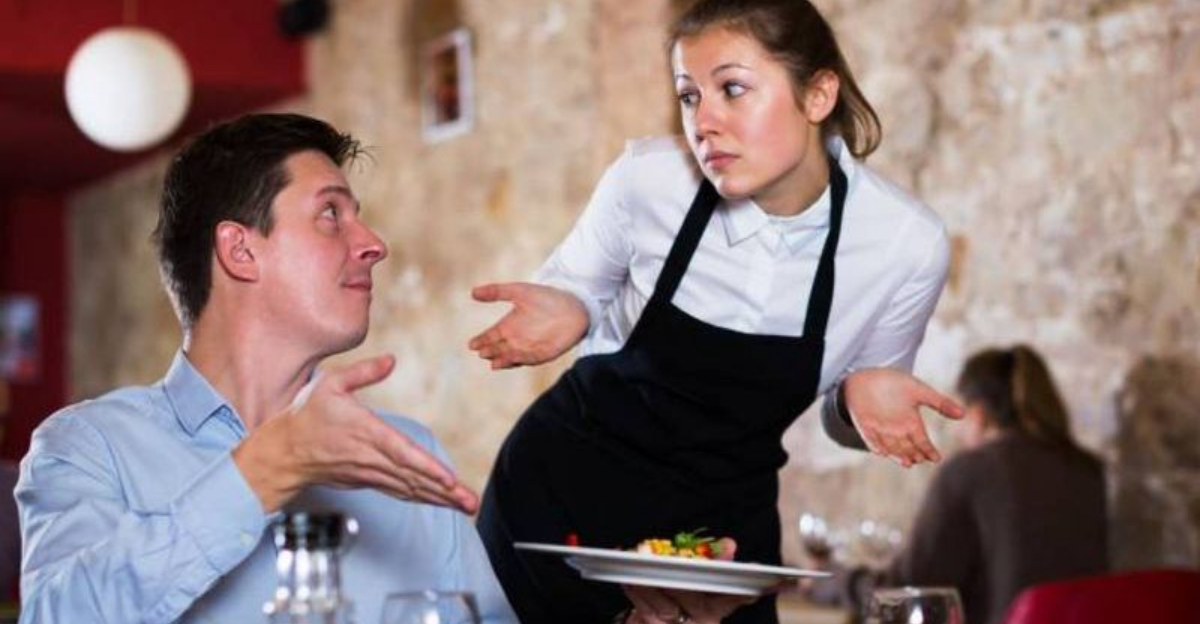10 Things You Should Never Do At A Fine Dining Restaurant, According To Etiquette Pros

Fine dining isn’t just about fancy food and crystal glasses — it’s its own little world with rules that can trip up even the most seasoned diners.
One wrong move and you might find yourself the subject of more than a few raised eyebrows.
Luckily, etiquette pros have your back, calling out the classic faux pas that can turn an elegant night into an awkward memory.
Whether it’s how to handle silverware or what to say (or not say), knowing what not to do might just save your seat at the table.
1. Showing Up Fashionably Late
The kitchen plans every detail of your dining experience with military precision.
Arriving late without calling ahead throws their entire operation into chaos, especially at restaurants with tasting menus where courses are prepared in careful sequence.
Your tardiness affects not just your table but potentially every other diner in the restaurant.
Most fine establishments hold reservations for only 15 minutes before considering them forfeited, so that quick text could save your table.
2. Turning Your Table Into a Phone Display
Nothing screams “I don’t understand fine dining” quite like placing your smartphone right next to your exquisite place setting.
That glowing rectangle destroys the ambiance the restaurant has meticulously created with lighting, music, and décor. Keep your phone tucked away in a pocket or bag, set to silent—not even vibrate.
If you absolutely must take an emergency call, excuse yourself and step into the lobby or outside. Your dining companions and neighboring tables will silently thank you.
3. Playing Amateur Food Photographer
“Wait! Don’t eat that yet—I need a picture for Instagram!” The chef spent hours perfecting that soufflé, and it’s deflating while you adjust your lighting.
Excessive food photography disrupts the dining experience for everyone nearby. If you must capture a special dish, take one quick, discreet photo without flash.
Better yet, many upscale restaurants now offer professional images of their signature dishes upon request—let them handle the food photography while you focus on enjoying the meal.
4. Conducting Business at Full Volume
Your booming voice describing quarterly sales figures is drowning out the sommelier’s careful explanation of wine pairings at the next table.
Fine dining spaces are designed for intimate conversation, not conference calls. Modulate your voice to match the restaurant’s atmosphere—typically several notches quieter than casual dining.
Remember that sound carries easily in these carefully designed acoustic spaces. If you’re struggling to hear your dining companion, it might be a sign you should both speak more softly, not more loudly.
5. Flagging Down Servers Like Taxis
Those frantic hand waves and “excuse me!” shouts might work at a diner, but they’re the equivalent of a dining etiquette crime in fine establishments.
Professional servers are trained to be attentive without hovering, constantly scanning their sections for subtle cues.
Make brief eye contact and give a small nod when you need something. If that fails, raise your hand slightly at chest level when the server looks in your direction.
Remember, patience is part of the experience—rushing through courses defeats the purpose of fine dining.
6. Creating Your Own Scent Menu
Fragrance and fine dining are mortal enemies. That cologne you liberally applied before dinner? It’s now competing with the delicate aroma of truffles that cost more per ounce than gold.
Scent is crucial to taste, which is why chefs are horrified when diners arrive wrapped in a cloud of perfume. Apply fragrances lightly or skip them entirely for fine dining experiences.
Your tablemates—and everyone trying to enjoy the subtle flavors of a tasting menu within fifteen feet of you—will appreciate your restraint.
7. Racing to Start Before Others
Grabbing your fork while others’ plates are still being delivered signals impatience rather than enthusiasm.
In fine dining, synchronicity matters—the kitchen times each course to be enjoyed together, at optimal temperature and presentation.
Wait until everyone at your table has been served and your host has begun eating or indicated others should start.
The brief pause builds anticipation and shows respect for both the kitchen’s efforts and your dining companions. For larger groups, the rule softens—typically wait until at least three people have been served.
8. Wielding Utensils Like Garden Tools
That fish knife isn’t just fancy window dressing—it’s designed specifically for delicately separating flaky fish from bone.
Each specialized utensil in the intimidating array before you serves a purpose in enhancing your dining experience. The basic rule?
Work from the outside in with each course. Hold knives in your right hand, forks in your left (unless you’re left-handed).
Never grip utensils in fists like weapons—instead, rest the handles against your palms with your index fingers extended along the backs.
9. Playing Amateur Busboy
Your helpfulness in stacking plates or passing them to the server actually creates chaos in a well-orchestrated fine dining experience.
Each staff member has specific responsibilities and sequences for clearing courses.
When you’ve finished, place your utensils together on the plate at the 4 o’clock position—this signals you’re done without disrupting the service flow.
Resist the urge to reorganize the table or consolidate dishes. The staff has a system that your well-intentioned assistance actually disrupts.
10. Creating Bill Drama Tableside
Nothing ruins the magical afterglow of a perfect meal faster than an awkward dispute over who owes what. Fine dining is as much about the experience as the food, and that experience should end gracefully.
If splitting the check, discuss your approach before ordering or step away from the table to work out details.
For business meals, determine who’s hosting beforehand. The smoothest move? Arrange payment discreetly with the restaurant ahead of time or slip your card to the server during a private moment.
